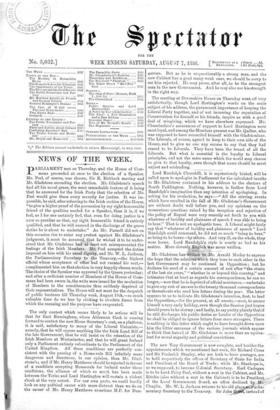NEWS OF THE WEEK.
pARMAMENT met on Thursday, and the House of Com- mons proceeded at once to the election of a Speaker. Mr. Peel, of course, was chosen, Sir E. Birkbeck moving and Mr. Gladstone seconding the election. Mr. Gladstone's speech had all his usual grace, the most remarkable feature of it being that he answered for the Irish Party that the selection of Mr. Peel would give them every security for justice. It was im- possible, he said, after referring to the Irish section of the House, "to give a higher proof of the possession by my right honourable friend of the qualities needed for a Speaker, than it is, if we feel, as I for one certainly feel, that even for doing justice in a case SO peculiar as that, my right honourable friend is entirely qualified, and that he will succeed in the discharge of the grave duties he is about to undertake." As Mr. Parnell did not on this occasion rise to enter any protest against Mr. Gladstone's judgment, it must be assumed that he wished it to be under- stood that Mr. Gladstone had at least not misrepresented the feelings of the Irish Members. Mr. Peel accepted the duties imposed on him with his usual dignity, and Mr. W. L. Jackson, the Parliamentary Secretary to the Treasury,—the highest official whose acceptance of office had not vacated his seat,— Complimented him on that election in very happily chosen words. The choice of the Speaker was approved by the Queen yesterday; and after a sufficient number of Members of the House of Com- mons had been sworn in, the writs were issued for the re-election of Members in the constituencies thus suddenly deprived of their representatives. The House will not meet for the despatch of public business till Thursday week, August 19th,—so much valuable time do we lose by sticking to obsolete forms from which the meaning and the purpose have evaporated.


































